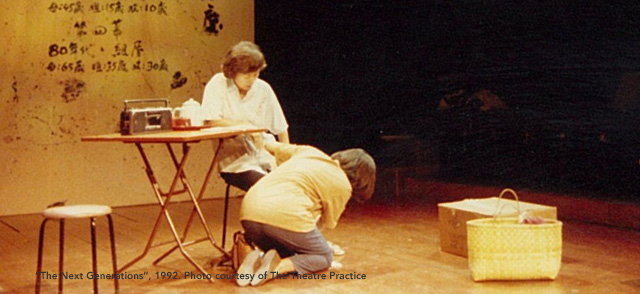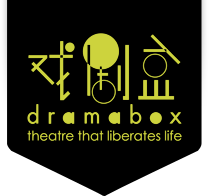
December 2011
Dialogue: Of Women — from the perspective of female theatre practitioners in Singapore
Moderator: Kok Heng Leun (Artistic Director of Drama Box)
Participants:
Tan Wan Sze, full-time theatre practitioner, cast of "Old Maid"
Holly Ho, playwright of "Old Maid"
Li Xie, full-time theatre practitioner, director of "Old Maid"
Ng Sin Yue, playwright of "The Jade Bangle"
Prelude
In conjunction with two upcoming performances "Old Maid" and "The Jade Bangle" from "New Play Season 2011", we decided to kick things off with the theme of "women" in the pilot issue of our newsletter.
We invited four women – Tan Wan Sze, Holly Ho, Li Xie and Ng Sin Yue – who would be involved in the aforementioned plays, to have a dialogue about what it means to be a woman in our local social-cultural context, and also in Singapore's theatre industry.
To moderate this conversation, we got a heavy-weight (we also mean this literally) – Kok Heng Leun, artistic director of Drama Box, whom we thought should be adept in dealing with the other sex, as all his full-time staff are women. However, things went downhill within a few minutes as the four women struck at their common "enemy". Heng Leun fought a lonely battle being the only "man in sight", while I stood by the sidelines. Due to the space constraint, I cannot possibly record the brilliant dialogue in its entirety. Nonetheless, I hope to present the essence of the dialogue.
Scene 1—Gender Vs Ability?
Heng Leun: In our local theatre "ecology", most of the backstage crew and administrators are women, but a great number of artistic directors and directors are men. How do you view or interpret this phenomenon?
Li Xie answers, "That's because men abhor these jobs." The others add that in Singapore, many technical staff and nearly all designers are males.
Li Xie responds sharply to Heng Leun's question, "Without a woman bearing children for you at home, could you be an artistic director with such ease? " Ouch!
Heng Leun: Let's talk about this from another angle — as a woman working in the local theatre line, are you treated differently? Do you have a platform to exercise your strengths?
Li Xie presents the analogy of a presidential election, stating that women and men will definitely receive different treatments, for this goes back to the fundamental question of how society views women.
Heng Leun questions, "Is it difficult to have a dialogue between males and females? Or is the theatre a more liberal environment?" To which Li Xie responds that it is not difficult to have a dialogue between both sexes, but "you will need to chasten yourself to become a man."
"And this could be the saddest thing—why do I have to chasten myself to be like a man... especially when I first started out."
Li Xie states that she has a strong personality, so she did not chasten herself to become like a man. In her early years as an actor, she was aware that people watched her every move, although it was never clear if it was because of her gender or ability. But when she crossed over to become a director, the question did not matter anymore.
Wan Sze feels it would depend on which aspect of theatre one works in. Actresses seldom face discrimination, not as much as women who work offstage. In order to command their co-workers, female backstage crews often have to be more "garang" ("strong or fierce" in Malay), and can only revert to their "softer" side after work.
Scene 2: The voices of women in writing
Sin Yue states that she had not intended to write "The Jade Bangle" (scheduled to stage in end of year) from the female viewpoint, but people will always see her script as a feminine play, or a "woman's" play.
At first she wanted to write a story of a male Primary school teacher, but she realised that she was not interested in such a character—she has always been more familiar with women, so naturally she focused her play more on women. She feels that her script questioned more general human issues than gender issues, for the male characters in her play are in a vulnerable state too.
Heng Leun: In the search for the voices of women, do you think women in theatre would need to be more prevailing and take charge of their own creations?
Sin Yue thinks that, as opposed to the general workplace, gender difference is almost non-existent in the theatre. In fact, she feels more theatre practitioners should step forward to take charge, not just women. The director of each theatre group is important because they are the ones who will represent and decide on the style of their group. Male theatre practitioners are thought to be more sensitive and liberal about gender roles than men who work in other industries, so it is actually more difficult to point out the sexists in the theatre line. She wonders why there are lesser women who take up the role of an artistic director or other leadership roles. Is it because women are less able to articulate?
Heng Leun: Are there any women-related issues that you feel needs to be discussed in theatre? For example, if women still belong to the socially vulnerable group, is there any need to talk about it? Or, do you think women belong to such group?
Li Xie believes that once we start to define "women issues", that in itself is a form of discrimination, because these issues are actually general human issues. It just happens that people do have differences in genders.
Sin Yue raises an example: the key issue regarding domestic workers is actually their social class and status, and not because they are women. She felt that gender difference is not obvious in Singapore. Women in Singapore are generally more competent, because of the education they receive.
According to Li Xie, this boils down to the problem of human rights, and also the problem that some countries empower certain groups of people. Being part of the disadvantaged minorities does have something to do with gender—that is the result of a value system that has formed a fixed set of outlook, depriving women of their rights.
Epilogue: Revolution begins with our own bodies
Holly: Women playwrights would move on after writing about women's issues, and explore different themes and subjects.
When Li Xie first began her career in theatre, she did not like reporters labeling her as a "feminist playwright". But she had it all figured out: she would start off as a feminist playwright, then continue to create works as a "humanist playwright". Therefore the "female" in "feminist" will not be as important, for knowing what you are concerned with, the kind of "-ist" you are, will be of more importance. At the very end, it still goes back to the root question of human issues and conditions.
With that, Heng Leun concludes the session: Women are the first group to represent the socially vulnerable. In an ideal world, when the balance between men and women is re-adjusted, the difference between men and women may not have any more significance—the only concerns that would matter would be human issues.
Indeed, it may be too narrow-minded to set "women" as a theme, for theatre (and any other art forms) should always go back to addressing human issues.
The dialogue ends "peacefully" as both men and women "shook hands and made peace". Conflicts may not necessary incite a riot, but more often facilitate understanding and communication. I have gained much from it, and look forward to more dialogues and discoveries in the near future.
 Quote "Friend of Drama Box" before your order to enjoy a 10% discount off food and beverages at CrazyWorld Café. Promotion ends 31 December 2011.
Quote "Friend of Drama Box" before your order to enjoy a 10% discount off food and beverages at CrazyWorld Café. Promotion ends 31 December 2011.
